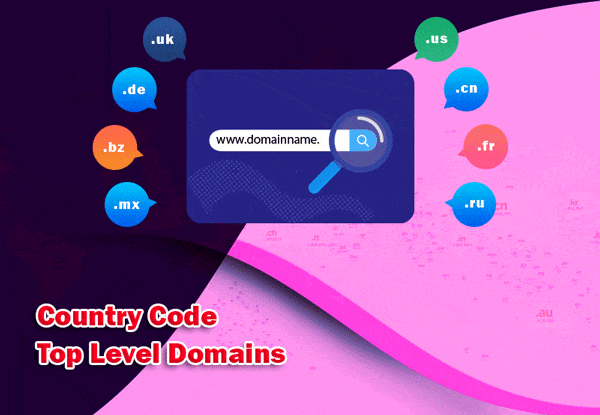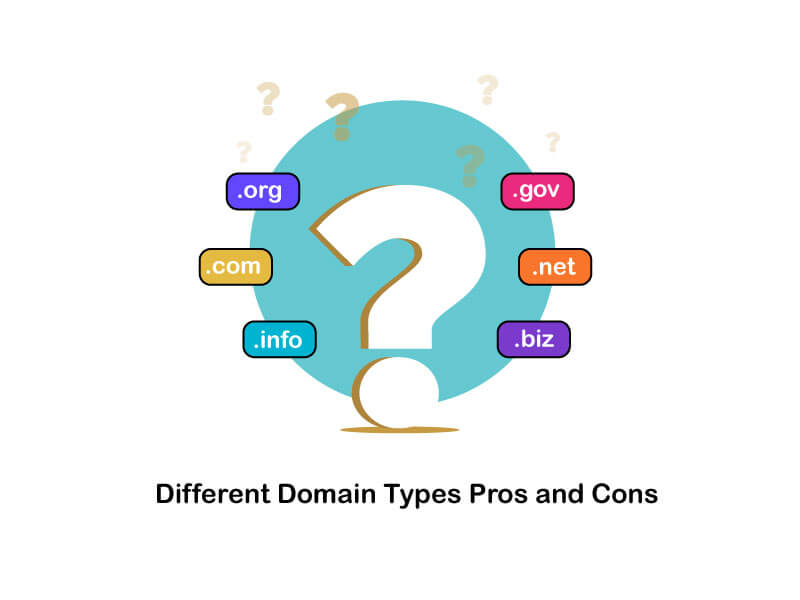What are the different domain types list available? When you decide to start your website or the corporate domain name, the first thing that comes to mind is what types of web domains you should register? Choosing the right types of website domains is vital for anyone who is entering the web world. Every domain extension has a story to tell and by looking at them, people judge the business type.
If you are building a business then the domain selection process must be done after thorough research and developing the future vision of the domain. Companies who have planning to expand their business in the global market must choose the internationally recognized internet domain types such as the .com domain name.
Your website becomes your face on the web. People recognize the brand through its online presence. By using the right types of internet domains, you can increase the chance of success in the web world. Easy to remember and brandable domain name would make your journey comfortable.
The domain name will be the face of your profession or business and every brand name is recognized with their domain name. You can establish a multi-billion dollar industry with a single domain name that becomes the identity of your business.
Therefore, while choosing the domain name, you should be clear about the purpose of registering the particular domain name. It must be easy to remember and short to type. No one would prefer to type the long domain name that contains several characters. It would be hard to type as well as recall when next time the user wants to visit your website.
In this article, we will discuss what is domain name in website . So, let’s dive in!
What Are the Different Domain Types?
When it comes to the domain name, users usually wonder what are the different domains? Usually, when a person decides to buy a domain name, the most common extension that comes to mind is the .com domain. It is widely used and there is a reason why it gets premier attention among other website domain types. The. Com domain developed for commercial use. Later it is released as a generic top-level domain.
Over the period, the .com gains international recognition and people have started using it for international marketing. Today, any website that you want to register online can be purchase using the .com extension. Anyone can buy the .com domain and use it for any purpose. It is a global domain and serves global audiences.
If you aim to know how to hide whois information , this article can help you!
Top 5 Different Types of Domain Extensions
1- Top-Level Domains
Top-level domains are the most common domain type of website and are used for various purposes. They are in the top spot of the hierarchy of domain names. You get the option to choose from the thousands of different types of top-level domains (TLD).
Remember that there are different domain types name categories available to choose from. That doesn’t mean you go with the random choices and select the ones which are available. Many people make these mistakes and later they realize the domain name doesn’t suit their business type.
If you want to figure out the seo subdomain vs subdirectory differences, check this article out!
All types of domains have some meaning; for example, the .org is registered for the organization and .travel is representing the travel industry. So knowing your business first and then selecting the different domain extensions would make a big difference. Do not purchase a domain name only because it is available to buy.
Keep in mind that when you’re choosing domain categories for your website, you’ll want to choose one that’s in alignment with, or enhances, your brand and overall domain. Just because a particular TLD is available, it doesn’t mean you should register it. A lot of TLDs are more like vanity extensions vs. something you should use for the foundation of your site.
If you desire to check the availability status of a domain and know more about what is a whois record , click on the provided link!
Pros:
- Easily recognized and self-explanatory
- Use for global exposure
Cons:
- The majority of the popular domain names are already taken. You may have to satisfy your need with a unique name.
If you want to know what is a premium domain ? , this post can help you!
2- Country Code Top Level Domains
One of the other different domain names is ccTLD. Country-code top-level domain (ccTLD) is the local domain that is specially designed for local promotion. They represent different countries. Each country has its own ccTLD domain extension. Anyone who wants to create a local presence or start a business that serves regional customers can buy the country-specific domain to serve its users.
If you want to know about website localization benefit , check this article out!

For example, the company that wants to sell the product to French people can register the country-specific domain name .fr. You receive many benefits of using the local domain for your business. The search engine also gives importance to the region-specific domain name. Your journey to reaching the top spot for the niche keywords would be easy in comparison to the domains types that are not relevant to the region.
Pros:
- Country specific domain extension receives instant recognition by the local users
- Get benefit of the search engine optimization
Cons:
- May restrict exposure to the global market
3- Generic Top-Level Domains
A generic top-level domain is among the different types of website domain that are similar to the top-level domain to some extent. These domains are registered for a specific purpose; for example, the military organization used .mil. The education institution chooses the domain name .edu and etc.

- Industry-specific domain names
Cons:
- Limitation on how to use the domain for general purpose
If you want to know more about Difference Between ccTLD vs gTLD, click on the link provided!
4- Second-Level Domains
These types of domain names are easy to recognize due to extra characters added to the domain name with an additional dot to separate two words. For example. .co.uk, .gov.uk.
For more information about how to create a subdomain , click on the link provided!

Pros:
- Used by the region targeting companies or organization
Cons:
- Limited exposure on the global front
5- Third Level Domains
The last domain type example is the third-level domain. The term third-level domain is applied to the two concepts or types of the website. In the domain name the first three characters “www” are part of the third level domain name. Also, when you create a subdomain on your website, the different domain extensions of the subdomain is considered as the third-level domain name. Use subdomain names to create a blog, backend system, user dashboard, or database storage.
Pros:
- The third level domain is the part of the main domain
Anything that you do on the subdomain is connected to the main website; for example, the marketing activities run for the subdomain are going to affect the main domain as well. People see the subdomain as a part of the main brand domain name. It is not a different entity. So when you are using the subdomain name, always remember that it is part of the main domain and do not perform any activity that will compromise the brand reputation.
Cons:
- It is not a separate entity, so cannot promote it independently. It is part of the main domain name
you might be interested to know about another domain type read ” what are nft domains ” article.
How To Choose the Right Type of Domain Name?
Now that you know what is a domain type, it’s important to choose the best domain name for your website so that could cover all of your needs. Here are 3 tips that can help you to find your suitable domain name:
1. it should be related to your website goals
You have to choose your domain name based on your website type. Think about what’s your website about and then find a domain name that aligns with your topic and overall goals.
For example, if you are going to build a website based in the US, you do have not to go with the “.co.uk” extension.
You can get help from other sites that are in your niche and find the best domain name that suits your needs.
2. go for something common first and fun second
In this case, There are a lot of options for you. If this is your first website, it is better to go with a more common domain name extension rather than an odd one! For example, if someone can remember your domain, not your extension, they will likely try common ones like “.com”, “.org” and so on. With a strange extension, the chances are very low for them to make it to your website.
3. pick up related extensions
After finding your desired domain name with a suitable extension, you can register your domain name and also pick up all of the related extensions. Then forward all of these different extensions to your primary domain.
But what are the benefits of doing this?
First, if someone guesses the wrong extension they will still get to your site.
Second, you will not let your competitors steal your domain name under a different extension.
It’s better to have a list of potential options for your domain name and then use a domain name checker to see if any of them are available or not.
Frequently Asked Questions
What Domain Type Is Associated With Commercial/Business Websites?
Among the domain name types list, the most common TLD is the .com which is usually used for commercial businesses. Also, it is worth mentioning that .org is an alternative for nonprofit organizations.
Final Words
Knowing the domain type meaning and its pros and cons would give you a better understanding of how the domain works and which domain type example suits your business best. When you decide to purchase your domain name, consider the given suggestions and make the decision based on your requirements. Also, you would require a DNS that you can buy from the hosting service provider. For more information click here.

tnx for this article
now, I know a lot of information about types of domain